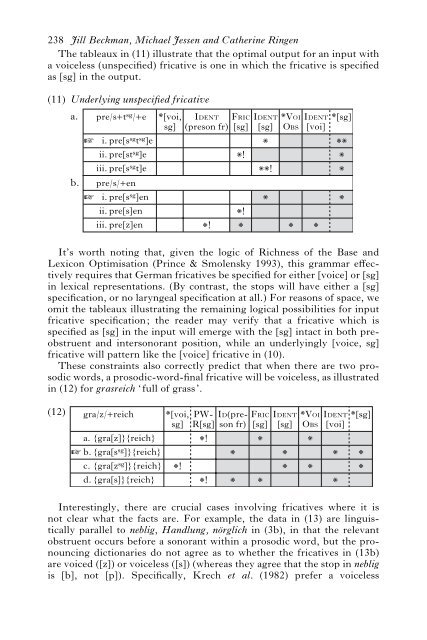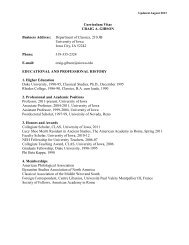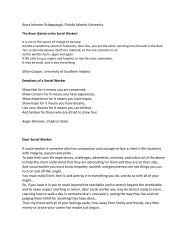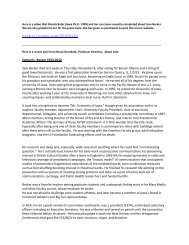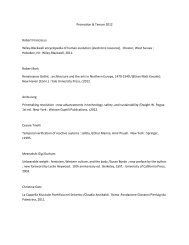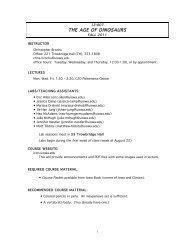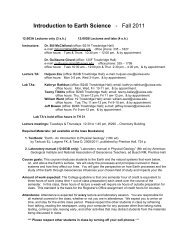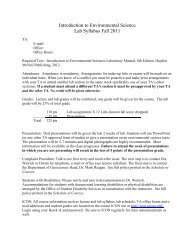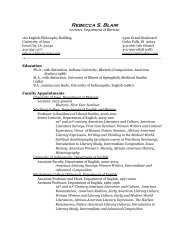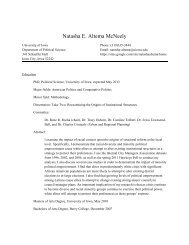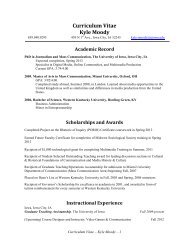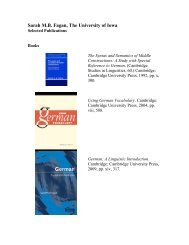German fricatives: coda devoicing or positional faithfulness?
German fricatives: coda devoicing or positional faithfulness?
German fricatives: coda devoicing or positional faithfulness?
Create successful ePaper yourself
Turn your PDF publications into a flip-book with our unique Google optimized e-Paper software.
238 Jill Beckman, Michael Jessen and Catherine Ringen<br />
The tableaux in (11) illustrate that the optimal output f<strong>or</strong> an input with<br />
a voiceless (unspecified) fricative is one in which the fricative is specified<br />
as [sg] in the output.<br />
(11) Underlying unspecified fricative<br />
a.<br />
b.<br />
<br />
pre/s+tsg/+e<br />
i. pre[ssgtsg]e<br />
ii. pre[stsg]e<br />
iii. pre[ssgt]e<br />
pre/s/+en<br />
i. pre[ssg]en<br />
ii. pre[s]en<br />
iii. pre[z]en<br />
*[voi, Ident<br />
sg] (preson fr)<br />
*!<br />
Fric<br />
[sg]<br />
*!<br />
*!<br />
*<br />
Ident<br />
[sg]<br />
*<br />
**!<br />
*<br />
*Voi<br />
Obs<br />
*<br />
Ident<br />
[voi]<br />
*<br />
*[sg]<br />
It’s w<strong>or</strong>th noting that, given the logic of Richness of the Base and<br />
Lexicon Optimisation (Prince & Smolensky 1993), this grammar effectively<br />
requires that <strong>German</strong> <strong>fricatives</strong> be specified f<strong>or</strong> either [voice] <strong>or</strong> [sg]<br />
in lexical representations. (By contrast, the stops will have either a [sg]<br />
specification, <strong>or</strong> no laryngeal specification at all.) F<strong>or</strong> reasons of space, we<br />
omit the tableaux illustrating the remaining logical possibilities f<strong>or</strong> input<br />
fricative specification; the reader may verify that a fricative which is<br />
specified as [sg] in the input will emerge with the [sg] intact in both preobstruent<br />
and interson<strong>or</strong>ant position, while an underlyingly [voice, sg]<br />
fricative will pattern like the [voice] fricative in (10).<br />
These constraints also c<strong>or</strong>rectly predict that when there are two prosodic<br />
w<strong>or</strong>ds, a prosodic-w<strong>or</strong>d-final fricative will be voiceless, as illustrated<br />
in (12) f<strong>or</strong> grasreich ‘full of grass’.<br />
**<br />
*<br />
*<br />
*<br />
(12)<br />
gra/z/+reich<br />
a. {gra[z]}{reich}<br />
b. {gra[ssg]}{reich}<br />
c. {gra[zsg]}{reich}<br />
d. {gra[s]}{reich}<br />
*[voi,<br />
sg]<br />
*!<br />
PW-<br />
R[sg]<br />
*!<br />
*!<br />
Id(preson<br />
fr)<br />
*<br />
*<br />
Fric<br />
[sg]<br />
*<br />
*<br />
Ident<br />
[sg]<br />
*<br />
*<br />
*Voi<br />
Obs<br />
*<br />
*<br />
Ident<br />
[voi]<br />
*<br />
*<br />
*[sg]<br />
*<br />
*<br />
Interestingly, there are crucial cases involving <strong>fricatives</strong> where it is<br />
not clear what the facts are. F<strong>or</strong> example, the data in (13) are linguistically<br />
parallel to neblig, Handlung, nörglich in (3b), in that the relevant<br />
obstruent occurs bef<strong>or</strong>e a son<strong>or</strong>ant within a prosodic w<strong>or</strong>d, but the pronouncing<br />
dictionaries do not agree as to whether the <strong>fricatives</strong> in (13b)<br />
are voiced ([z]) <strong>or</strong> voiceless ([s]) (whereas they agree that the stop in neblig<br />
is [b], not [p]). Specifically, Krech et al. (1982) prefer a voiceless


